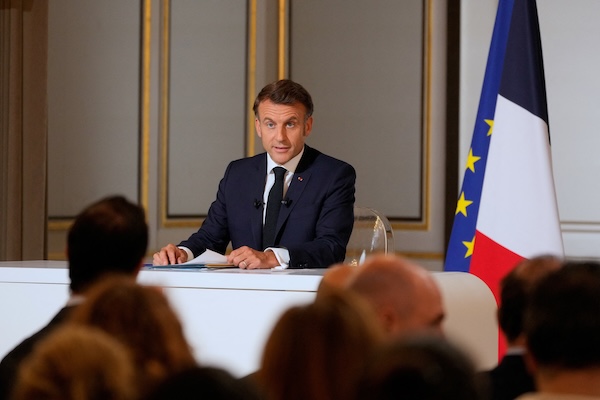 French President Emmanuel Macron holds a press conference, at the Elysee Palace, in Paris, Frida 13 June 2025;
Credit: Reuters, Michel Euler
French President Emmanuel Macron holds a press conference, at the Elysee Palace, in Paris, Frida 13 June 2025;
Credit: Reuters, Michel Euler
PARIS/RIYADH (Reuters) - On Friday 13 June 2025, French President Emmanuel Macron said a United Nations (UN) conference hosted by France and Saudi Arabia to work towards a two-state solution between Israel and the Palestinians had been postponed after Israel launched a military attack on Iran.
Two sources had earlier told Reuters that the conference would be postponed after Israel's attacks because logistically it would be difficult for countries in the region to attend.
Israel launched a huge wave of airstrikes across Iran on Friday 13 June 2025, targeting Iran's huge underground nuclear site, reportedly killing its entire top echelon of military commanders and nuclear scientists in the biggest ever direct attack between the foes.
"This postponement cannot undermine our determination to move forward with the implementation of the two-state solution," President Macron told a news conference. "Whatever the circumstances, I have stated my determination to recognise the State of Palestine."
Macron said logistically the Palestinian Authority and Saudi Arabia Crown Prince Mohammed bin Salman were simply not able to travel given the military escalation in the region.
He said the meeting would be rescheduled as quickly as possible.
France and Saudi Arabia had been set to host the gathering between Tuesday June 17 and Friday June 20 2025 in New York (United States – US), aiming to lay out the parameters for a roadmap to a Palestinian state, while ensuring Israel's security.
Macron, who had been set to attend on Wednesday June 18 2025, has previously suggested France could recognise a Palestinian state in Israeli-occupied territories at the conference, a move opposed by Israel.
US President Donald Trump's administration sent a diplomatic cable earlier this week to discourage governments around the world from attending the conference, according to a US cable seen by Reuters.
It had also warned of possible consequences for those who took measures against Israel, raising pressure on the participants and making Macron's potential decision to recognise a Palestinian state more complicated.
Macron could still at one point go ahead with becoming the first Western heavyweight to recognise a Palestinian state, but the desire in Paris is to have a collective momentum.
Diplomats say this could lend greater weight to a movement hitherto dominated by smaller nations generally more critical of Israel.
Macron's stance has shifted amid Israel's intensified Gaza offensive and escalating violence against Palestinians by Israeli settlers in the occupied West Bank and there is a growing sense of urgency in Paris to act now.








